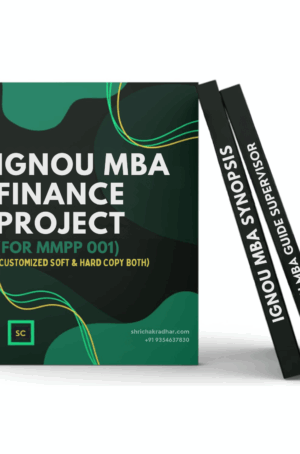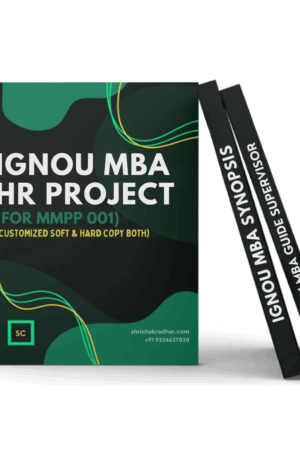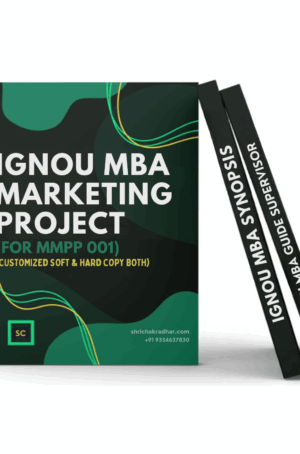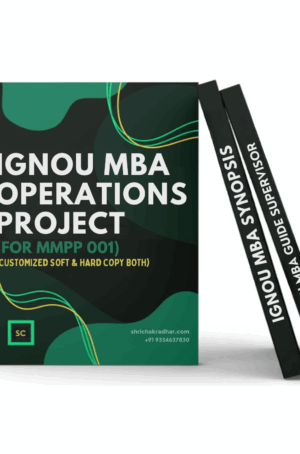IGNOU MBA Project (MMPP-1) (MS-100): Writing Services and Guidelines
The Indira Gandhi National Open University (IGNOU) offers an IGNOU MBA Project, which includes a mandatory project component. This IGNOU Project, often referred to as the MMPP-1 Project or MS-100, is a crucial part of the curriculum and allows students to apply theoretical knowledge to practical scenarios.
Need help with an MBA Project Report or Synopsis? This is no longer an issue. Our IGNOU MMPP 1 project synopsis writing services include the MBA Project Report and Synopsis. We are available 24/7 to all IGNOU students worldwide.
Whatsapp us to get the Personalized (Customized) or Readymade IGNOU MBA Project
Are you searching for the personalized & ready-made IGNOU MBA Project Report or the IGNOU MBA Synopsis?
Get your personalized MBA Project and synopsis as per IGNOU’s guidelines. 10,000+ MBA Synopsis Approved. We offer a plagiarism-free IGNOU MMPP 1 Project Synopsis Report. Get A+ grades in the MMPP 1 Project.
We have around 30+ professional writers on staff to help students produce and coach them as they embark on their IGNOU journeys. Our academics are always producing new IGNOU MMPP 1 projects and revising existing IGNOU MMPP 1 project reports in response to comments.
Check Availability And Get Started
Check the availability of your IGNOU MBA Projects for your stream by searching the specialisation of your program.
IGNOU MBA Operations Management ProjectIGNOU MBA Marketing ProjectIGNOU MBA Finance ProjectIGNOU MBF Project (Banking & Finance)IGNOU MBA HR Project
How do you choose a topic for your IGNOU MBA project?
Choosing a topic for your MBA Project is a critical step that can significantly influence the success and relevance of your research. Here are some detailed guidelines to help you select a suitable topic:
Steps to Choose a Topic for Your IGNOU MBA Project
Identify Your Area of Interest:
- Reflect on the subjects within your MBA coursework that you found most engaging.
- Consider areas where you have previous experience or would like to develop expertise.
Review Current Trends and Issues:
- Stay updated with the latest trends, challenges, and innovations in the business world.
- Read industry reports, journals, and news articles to identify pressing issues that need research.
Consider Your Specialization:
- Align your topic with your MBA specialization (e.g., Finance, Marketing, Human Resources, Operations, etc.).
- Ensure the topic allows you to apply the theoretical knowledge you’ve gained in your specialization.
Assess Feasibility:
- Evaluate the availability of data and resources needed for your research.
- Consider the time frame and whether the topic is manageable within the given period.
Consult with Your Supervisor:
- Discuss potential topics with your project supervisor or faculty advisor.
- Seek their feedback on the relevance, scope, and feasibility of your chosen topic.
Look for Practical Application:
- Choose a topic that has practical implications and can provide actionable insights.
- Ensure your research can contribute to solving real-world business problems or improving processes.
Narrow Down Your Options:
- Start with a broad area of interest and narrow it down to a specific aspect or problem.
- Define clear research objectives and questions to focus your study.
Check for Uniqueness and Originality:
- Ensure your topic is original and has not been overly researched.
- Aim to bring a new perspective or fill a gap in the existing literature.
Sample topics for IGNOU MBA project
MBA FINANCE
- A Comparative Study to Analyze the Financial Performance of Punjab National Bank and ICICI Bank (2020-21 to 2024-2025)
- Financial Performance of Housing Development Finance Corporation Limited (HDFC) Bank
- Working Capital Management of Vadilal Industries Ltd
- Financial Performance of Indian Oil Corporation for the Last 5 Year, I.E. 2020–21 to 2024–2025
- A Study of Investors and Brokers Attitudes Regarding Investment in Mutual Funds
MBA MARKETING
- Behaviour and Decision of Consumer for Buying Domestic Appliance Products in Jammu City
- The Effects of E-Marketing on Tourism And Hospitality Business Of Hotels And Tour Operators In Mumbai
- Customer Awareness towards Airtel’s 4g Services
- Marketing Practices of Agents and Their Perception Regarding Consumers in Promoting Insurance: A Case Study of Max Life Insurance in Delhi
- A Study on the Role and Importance of the Internet on the Marketing of Hotel and Tour Operator Business
MBA OPERATION
- Logistics Management in Retail Industry in D-Mart in Xyz City
- Supply Chain Management Practices in Retailing: A Consumer Perception Study
- Total Quality Management Development in Pharmaceutical Companies: A Case of Sun Pharmaceutical Industries Limited
- Concept of Operation Management on Service Delivery at Itc Hotels Limited
- A Study on Production Planning and Quality Control Effectiveness at Xyz Company
MBA HR
- A Study on Impact of Employees Welfare Policies on Employee Work Performance with Special Reference to Bank of India
- Role of Training and Development Process on Employees Working In Xyz Company
- Job Satisfaction as a Function of Job Involvement and Motivation in the Organization: A Case Study of Xyz Company
- A Study on Occupational Stress among Employees from Government and Private Sector Organizations in Xyc City
- A Study on Performance Management System at Xyz Company in Xyz City
How do you submit your IGNOU MBA Project proposal?
The submission process for your MBA project proposal involves a physical copy sent to IGNOU along with some additional steps:
Before Submission:
- Project Guide Selection: You’ll need to finalize your project topic and secure a project guide who agrees to supervise your work.
- Proposal Development: Once you have a guide, work with them to develop your project proposal following the IGNOU guidelines. This typically includes sections on the introduction, literature review, research methodology, expected outcomes, and timeline.
Submission Process:
- Required Documents: Here’s what you’ll need to submit:
- Properly filled-out Proposal Proforma: You and your guide must both sign this form, which is available from IGNOU.
- Project Proposal: A clear and concise document outlining your project as per IGNOU guidelines.
- Guide’s Bio-data: A detailed bio-data of your project guide with their signature and contact information.
- Submission Address: Send all the documents (only one copy) to:
The Coordinator (Projects),
School of Management Studies,
IGNOU, Maidan Garhi,
New Delhi-110068
What are the formatting guidelines for the IGNOU MBA Project report?
Follow IGNOU’s specific formatting guidelines, which typically include:
- Font: Times New Roman, size 12
- Margins: 1 inch on all sides
- Line Spacing:5
- Referencing: APA or MLA style, as specified
- Binding: Soft copy and hard copy (as required)
What are common mistakes to avoid in the IGNOU Project?
Common mistakes include:
- Poor topic selection: Ensure your topic is feasible and relevant.
- Inadequate research: Conduct thorough and rigorous research.
- Plagiarism: Always cite your sources.
- Lack of clarity: Ensure your report is well-structured and clearly written.
- Ignoring guidelines: Follow all IGNOU guidelines and formatting requirements.
How do you handle data analysis for your MBA Project?
Data analysis is a critical part of your MBA project, as it allows you to interpret the collected data and draw meaningful conclusions. Here is a detailed guide on how to handle data analysis for your project:
Steps for Data Analysis
Define Your Research Objectives and Hypotheses
- Clearly outline what you aim to achieve with your research.
- Formulate hypotheses or research questions that your data analysis will address.
Prepare and Clean Your Data
- Data Collection: Gather your data from primary (surveys, interviews, experiments) or secondary (existing datasets, reports).
- Data Cleaning: Ensure your data is accurate, consistent, and free of errors. This may involve removing duplicates, handling missing values, and correcting inconsistencies.
Choose the Appropriate Analysis Methods
Depending on your research objectives, select the appropriate statistical or qualitative analysis methods.
Quantitative Analysis
Descriptive Statistics
- Mean, Median, and mode: Measures of central tendency.
- Standard Deviation and Variance: Measures of variability.
- Frequency Distribution: Count of occurrences of different values.
Inferential Statistics
- Regression Analysis: Understand relationships between variables.
- ANOVA (Analysis of Variance): Compare means among multiple groups.
- Chi-Square Test: Test for relationships between categorical variables.
- T-Test: Compare means between two groups.
Visualization Tools
- Charts and Graphs: Bar charts, histograms, pie charts, scatter plots.
- Tables: Summarize data for easy interpretation.
Qualitative Analysis
Thematic Analysis
- Identify, analyze, and report patterns (themes) within data.
- It is useful for interview transcripts and open-ended survey responses.
Content Analysis
- Quantify and analyze the presence of certain words, themes, or concepts.
- Commonly used for textual data from documents and media.
Coding and Categorization
- Assign codes to different segments of data.
- Group codes into categories for deeper analysis.
Can you get external help for writing or editing your IGNOU MBA Project?
The question of getting external help for your MBA project writing or editing is a complex one. Here’s a breakdown of the considerations involved:
University Regulations:
- Academic Integrity: IGNOU emphasizes academic integrity, and any work submitted should be your original work. This means strictly avoiding plagiarism or ghostwriting.
Potential Benefits of External Help:
- Guidance and Feedback: Editors or writing consultants can offer valuable feedback on structure, clarity, and grammar.
- Time Management: If you’re struggling with time constraints, help with editing or proofreading can streamline the finalization process.
Important Cautions:
- Over-reliance: Don’t rely on external help to the point where you don’t understand the content of your own project.
- Content Originality: Ensure any help you receive focuses on editing and improvement, not creating original content for you.
Alternative Approaches:
- Project Guide: Your assigned project guide is your primary resource for guidance and feedback throughout the project development process.
- University Resources: IGNOU might offer workshops or resources on research writing and presentation skills. Utilize these resources to enhance your own writing abilities.
- Peer Review: Consider exchanging drafts with classmates for constructive feedback on structure and clarity.
Recommendations:
- Focus on Learning: If you do seek external help, prioritize learning from the process. Understand the edits and improvements suggested to strengthen your own writing skills.
- Cite Properly: If you use any external sources or reference materials, ensure proper citation following IGNOU’s guidelines.
What are the evaluation criteria for the IGNOU MBA Project?
The project is evaluated based on:
- Originality and relevance of the topic
- Depth and rigor of research
- Quality of data analysis and interpretation
- Clarity and coherence of the report
- Adherence to guidelines and formatting
- Presentation and writing quality
What happens if your MBA project is rejected?
It can be discouraging if your supervisor rejects your MBA project, but it’s crucial to comprehend the reasons why and take the necessary action to address them. Here’s what typically happens and what you can do if your project is rejected:
Reasons for Project Rejection
Incomplete or Inadequate Synopsis:
- Your project may be rejected if the initial synopsis lacks clarity, coherence, or does not meet the required standards set by IGNOU.
- Insufficient background information, vague research objectives, or unrealistic scope can also lead to rejection.
Methodological Issues:
- If there are flaws in your research design, sampling techniques, data collection methods, or data analysis, your supervisor may reject the project.
- A lack of alignment between research questions and methods can also be a reason for rejection.
Poor Quality of Writing:
- Grammatical errors, unclear writing, inconsistent formatting, or inadequate referencing can lead to rejection.
- The overall presentation of the project report may not meet academic standards.
Insufficient Data or Analysis:
- If your data is insufficient, incomplete, or inaccurately analyzed, your project may not provide valid conclusions or findings.
- Inadequate interpretation of results or unsupported conclusions can also lead to rejection.
Plagiarism:
- Any form of plagiarism, whether intentional or unintentional, can result in immediate rejection of your project.
- Ensure proper citation and acknowledgment of all sources to avoid plagiarism.
What to Do If Your Project Is Rejected?
Seek feedback and clarification:
- Understand the specific reasons for rejection from your supervisor.
- Request detailed feedback on areas that need improvement and clarification on how to address them.
Revise and Resubmit:
- Revise your project report based on the feedback received.
- Address all identified issues, whether they are related to methodology, data analysis, writing quality, or any other aspect.
Consult Additional Resources:
- Review relevant literature and seek guidance from other faculty members or experts in your field.
- Attend workshops or seminars on research methodologies or academic writing to improve your skills.
Follow Guidelines and Standards:
- Ensure that your revised project report adheres strictly to IGNOU’s guidelines and standards.
- Pay attention to formatting, citation style, and overall presentation.
Time Management:
- Plan your revisions and resubmission within a reasonable timeframe, considering any deadlines or timelines provided by your supervisor.
Maintain Professionalism:
- Approach the revision process with a positive attitude and a willingness to learn and improve.
- Communicate effectively with your supervisor throughout the process.
Learn from the Experience:
- Use the rejection as a learning opportunity to strengthen your research and writing skills.
- Reflect on what went wrong and how you can prevent similar issues in future projects.
How It Works – Simple 3-Step Process
-
Get in touch & choose your package – Share your specialisation, year, deadline, submission mode (hard copy or online).
-
Topic finalisation & payment – We propose 2-3 topics; you pick one; payment process begins.
-
Draft & delivery – We send draft/synopsis → you review → final project delivered in your inbox (with printing instructions if needed).
-
You submit to your RC/online portal as per IGNOU rules. onlineproject.ignou.ac.in+1
-
Quick Checklist for MMPP 1 Project Success
Here’s a handy checklist to ensure you meet IGNOU’s expectations:
- Select a relevant and approved topic
- Get approval from your project guide
- Follow IGNOU formatting guidelines (font: Times New Roman, size: 12, spacing: 1.5)
- Include all required sections: Abstract, Objectives, Methodology, Findings
- Submit your project before the deadline along with signed approval forms
Use this checklist before submitting to avoid common mistakes.
IGNOU MMPP 1 Project Timeline
You can visualize this in an infographic, but for now, here’s a clear breakdown:
| Step | Description | Suggested Timeframe |
| Topic Finalization | Choose and finalize your topic | Semester Start (Month 1) |
| Guide Approval | Submit guide details for approval | Month 1–2 |
| Synopsis Submission | Submit project proposal (synopsis) | Month 2 |
| Project Writing | Begin full report writing | Month 3–5 |
| Final Submission | Submit the completed project | Month 6 |
Common MMPP 1 Mistakes and How to Avoid Them
- Copy-pasting from the internet
- IGNOU may reject plagiarized content.
- Use samples only for inspiration. Always write your own.
- Missing guide signature
- Projects without proper approval are invalid.
- Ensure your guide signs all required pages.
- Skipping research methodology
- Methodology is a scoring section.
- Include tools used, sample size, and data collection methods.
Ready to get your IGNOU MBA Project Report and Synopsis Sample PDF for MMPP-1?
- Call us or WhatsApp us at: 9958947060, 9354637830
- Visit: SHRICHAKRADHAR.COM





